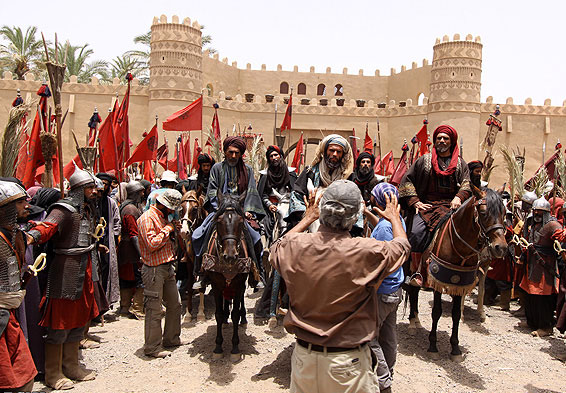
Director Ahmad Reza Darvish directed the epic religious tale of the Ashura revolt. Despite abiding by many of Iran's religious ethics to make the film, conservative religious elements eventually called for its ban. Image from Art Director, published for reuse.
This is the first part of a post that originally appeared on iranhumanrights.org and is published here in collaboration with the International Campaign for Human Rights in Iran. Read the second part on Global Voices here.
Despite repeated statements made by President Hassan Rouhani regarding the need to allow more cultural freedoms in Iran, the banning of films in the Islamic Republic has continued unabated during his two-year administration.
The latest film added to the list of forbidden cinema was as recent as July 2015, when the Ministry of Culture and Islamic Guidance, under the direct authority of President Rouhani, banned “Rastakhiz”. This brought the number of films that have not received permission for public screening to 14 in Iran since 2007.
Although most of these films were prevented from screening during Mahmoud Ahmadinejad’s presidency (2005-2013), they have yet to be seen by the public two years after Rouhani replaced him.
The most frequent reasons for the bans include references in the films to the mass peaceful protests that followed the disputed 2009 presidential election in Iran, a highly sensitive subject in the Islamic Republic that hardliners continue to refer to as the “sedition,” and issues with what is perceived as “poor” hijab (female attire) on actresses.
On June 5, 2013, during his presidential election campaign, Rouhani promised he would “hand over the monitoring of cultural matters to the people,” and he questioned how any individual censor could fairly judge a film’s religious violations. Such remarks increased hopes that banned films would make their way to the cinemas if Rouhani was elected.
Statements in support of cultural freedom continued during Rouhani’s presidency. In a meeting with artists and cultural figures on January 8, 2014, he stated, “Viewing the arts as a security concern is the biggest mistake.” He went on to say, “If there is no freedom, true artistic creations would not be produced. We cannot create and produce arts on order. Any type of security atmosphere can nip arts in the bud.”
In June 2015, at a press conference marking the second anniversary of his election to office, in response to a question by a reporter about the widespread cancellation of concerts over the past year, Rouhani said, “In the cultural domain, we believe cultural affairs should be relinquished to the people of culture, and the atmosphere must be facilitated so that consumers and producers of cultural works can meet.”.
Nevertheless, the disputes between the Rouhani administration’s Ministry of Culture and Islamic Guidance and Iranian filmmakers have still not been resolved, and the films remain banned.
A number of the blacklisted films were initially shown at the Fajr International Film Festival in Tehran, and some were screened in cinemas for a few days before being pulled. The latest casualty, “Rastakhiz”, was banned on the day it premiered, even though 40 minutes of it was cut to receive a screening permit from the Ministry of Culture and Islamic Guidance.
“Rastakhiz” is a religious feature film set in 7th century Iraq that tells the story of the Ashura revolt, when Hossein, the Prophet Mohammad’s grandson and the third Imam of Shia Muslims, fought against the ruling caliph and died in an unequal battle near Karbala. Some religious leaders took issue with the depiction of Imam Hossein’s uncle Abolfazl al-Abbas. According to Shia theology, reproducing the face of the Imams and their family members is forbidden.
Director Ahmad Reza Darvish received many awards and accolades when “Rastakhiz” was first shown at the 2015 Fajr International Film Festival. But criticism from religious quarters was so strong that he was forced to cut 40 minutes of the film to satisfy Ministry of Culture and Islamic Guidance censors. Some religious leaders, however, were still dissatisfied and eventually forced the Ministry to pull its permit.
During the past two years, extreme positions taken by conservative members of parliament and hardline media, along with ultraconservative religious groups, have played a central role in preventing films from public viewing.
In September 2014, the Cultural Affairs Committee of the Iranian Parliament wrote a letter to the Minister of Culture and Islamic Guidance demanding he refuse screening permits for eight films that appeared to be sympathetic to the public “rebellion” against Ahmadinejad’s victory in the widely disputed 2009 presidential election.
“What we expect from the institution in charge of the film industry is to have the authority to carry out its decisions. The Ministry of Guidance gave a permit for the screening of my film [“Khaneh Pedari” (The Paternal House)] but then it was forced to pull it down after just two days, even though it was only being shown in a small cinema,” director Kianoosh Ayari told the International Campaign for Human Rights in Iran.







4 comments